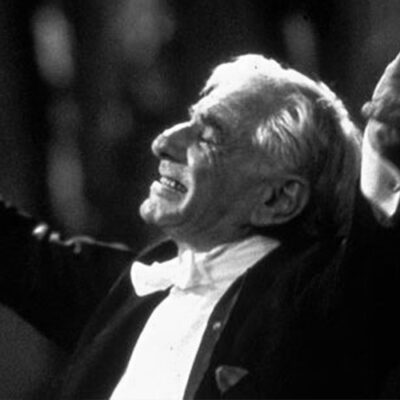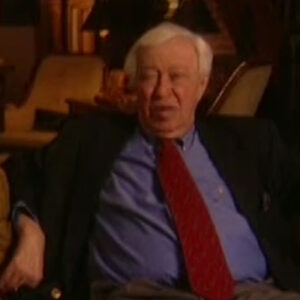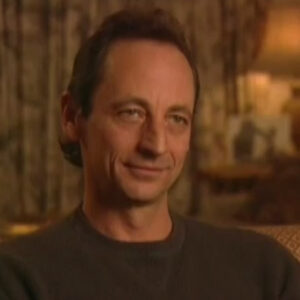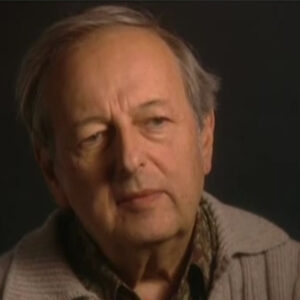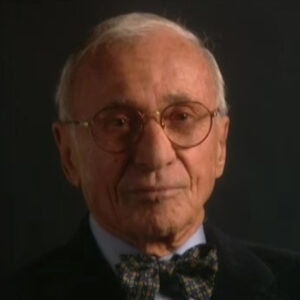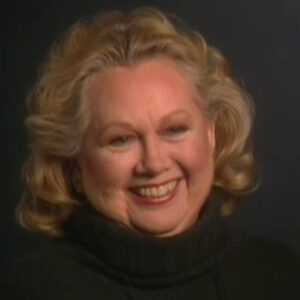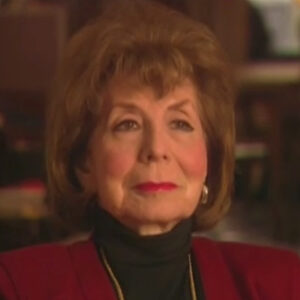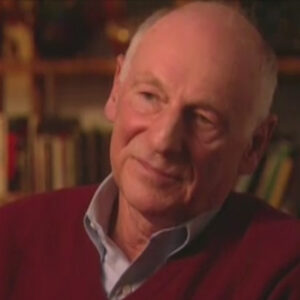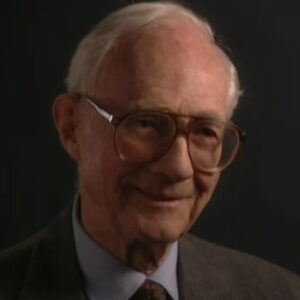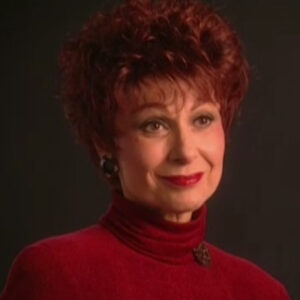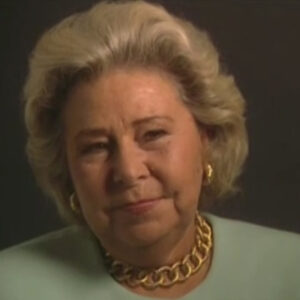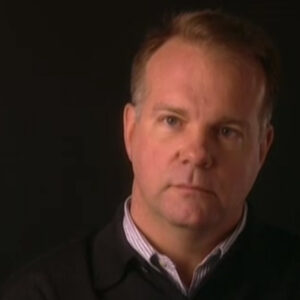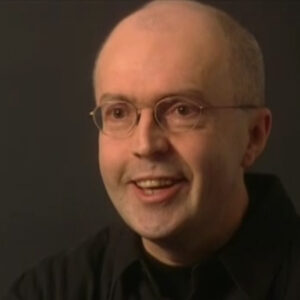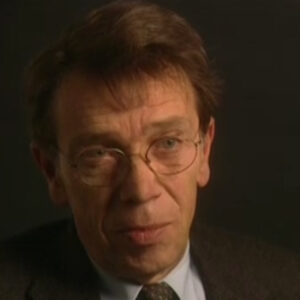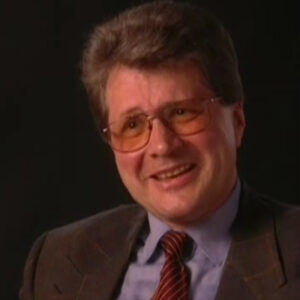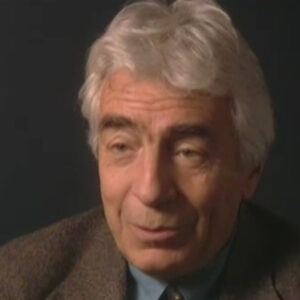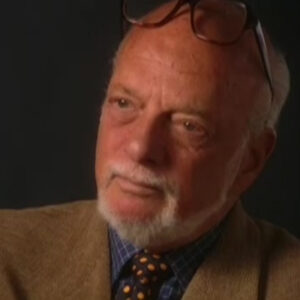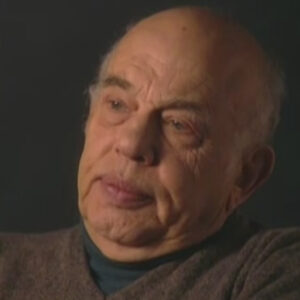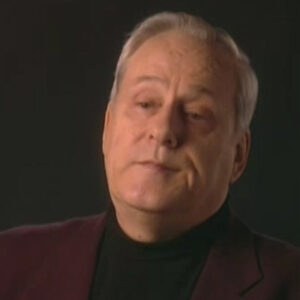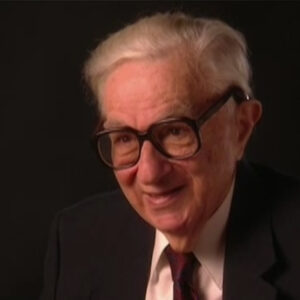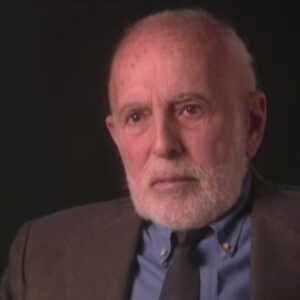Speaker I’ve just had a wonderful conversation with Nina. By the way, you know, I name is so right my questions and she was talking.
Speaker The difference of her experience growing up in the very small family, because she came to later, she missed the golden period and that was so much a part of your youth. I think more much more so than the meanness. Can you just kind of describe what she means by that? The golden period?
Speaker Well, this is how we explain to one another the difference between the time when Alexander and I were little kids and the time when Nina was born, which was in 1962 when I was born. It was 1952. And in retrospect, it seems incredible that that was only seven years after the end of World War Two. It was really another era. And Alexander was born in 55, just two and a half years after me. So at that time, we were still living in the ausborn, which was on West 57 opposite Carnegie Hall. And the family was very young. And I guess my father was still. Glorying in the in in his success, it still seemed like a relatively new thing.
Speaker Everything was new, his career was new and his family was new and his marriage was new. Everything was new. And there was all this energy, youthful energy in the house that it was a time full of people. The house was always, it seemed, bursting with people who were laughing and making a racket.
Speaker And there was a lot of you know, I had this sense of grown ups as being these, you know, sort of rackety, hilarious creatures who who were always making a ruckus and having a wonderful time. And that was that was how I felt. Was downstairs in the library would be all these people making a big noise. And if I came in, they would all be very friendly and attentive. And then I would say goodnight and go to bed. And the racket and the and the laughter would go on for hours downstairs.
Speaker And this was a big extended family that was there for you, for your whole. Who is going to.
Speaker Well. This family of ours.
Speaker Had my father’s brother and sister, of course, and then then, you know, there were all the people that were peripherally involved with my father’s career, so there was certainly Betty and Adolph. And then later when Adolf married Phyllis, she was part of the gang and there was Richard Avedon and Mike Nichols. They all were part of that group. And Steve Sondheim was very much part of the group. And he was a collaborator. So he was part of the the group that that were people my father worked with. So and I guess Jerry Robbins and Arthur Laurents must have been in there at some point, too, but but they were they were less of the less in the core group.
Speaker Then there were you know, there was Mike Mindlin and and all the sort of crowd that became part of L.A. I guess there was a whole Los Angeles connection that Mike Mindlin became a part of, too.
Speaker And there was Louie Almeda. There was, you know, actually there there were friends of my mother’s from her acting career.
Speaker And that would include Mindy Wager, whom I guess she became friends with as well as my father. They each met each other so that Mindy can tell you about that. But there was Mindy then there was Louie Almeida, who was a friend of my mother’s that she met through acting, who was really like an uncle.
Speaker He was very much around and oh, I don’t know, it just goes on and on. Who do I leave out?
Speaker So you mentioned that he was very dynamic, I guess.
Speaker Oh, yes, he is. He’s around. He’s around. He’s he’s an odd duck. And I don’t know whether you’ll be able to convince him to talk to you, but you can try. He lives in the ausborn to this very day. I mean, just.
Speaker We don’t hardly see him anymore, and he’s had his ups and downs in his life, so and he’s he’s, as I say, he’s become sort of a recluse or something. He we don’t see him very often. And he always was kind of shy socially. So he didn’t you know, he wasn’t a big party animal. We saw him more when we were when it was just us. And he played squash with my father. He was my father’s big squash partner. So he was around a lot.
Speaker How much do you remember the lessons, two years.
Speaker I don’t remember that much specifically from the West Side Story years, I was five years old when West Side Story arrived. So that meant I was very little while it was being written. And I just have this general memory of the of the early years of my father’s studio being a place that was absolutely humid with cigarette smoke. And through the murk you could see either, you know, Steve Sondheim or Betty and Adolph or whoever was in there, Jerry Robbins. It was kind of hard to see in there, but there were all these people working and smoking their heads off.
Speaker Why did you start going to Tanglewood now?
Speaker It’s funny about Tanglewood. I think I must have been in Tanglewood maybe once or twice as a very, very little girl. And then I didn’t go to Tanglewood again until I was working there as a teenager. And after my senior year of college high school, not till my senior year of high school did I go back there. So I’m not sure why that is, but I think my father didn’t really go to Tanglewood too much for a while. And then he went back to Tanglewood and started going there regularly. Once Alexandra and I were in our teens then and then we got to work there ourselves during the summers and that was a lot of fun. And then Nina did that, too, when she got a bit older. Is that a good experience for you?
Speaker I have very fond memories of Tanglewood, but they don’t tend to be that summer that I worked there. I didn’t have a very good time that summer. I think it was it was complicated.
Speaker But what was your dad like?
Speaker Well, Tanglewood was a place that that had where where my father really kind of burst out of his chrysalis, I think, as a as a young man and he had more fun in Tanglewood than he had ever had in his life, is the impression that I got.
Speaker And when I went there to work, I would hear all these stories about, oh, the days when Lenny was a Tanglewood and there were hundreds of stories floating around about his wild and crazy youth. Then my when I saw him at Tanglewood, he was, you know, on pretty good behavior and he just loved it there. He loved to be around kids and he loved to stay up all night yakking with them. And and he loved to find out what they were thinking about and what the music was that they were listening to. He was always curious.
Speaker Did your mother and I know she’s there in the 40s.
Speaker That’s right. And there’s that cute picture of her and Shirley sitting back to back see in that picture. It’s very cute. My mother loved Tanglewood less because it did have this connection to my father’s wild and rowdy past, about which she just as soon not know more, so I think she kind of gave it a wide berth.
Speaker What do you. How would you characterize it, this is a loaded question of.
Speaker Your parents marriage. Why isn’t that a loaded question? It’s just not OK. Well, all right.
Speaker Well, it’s a very big question and I have to think about this for a while. Marriage, I’m discovering for myself, is a very complicated long term business, and it doesn’t stay one way, it changes. It’s like a creature that grows and changes. So I guess I saw my parents marriage in various phases.
Speaker And certainly when I was a little girl, they seemed very carefree and they didn’t seem that so much that way. When I started getting into my teens, I think that their marriage must have been changing, their lives were changing. And then I saw things actively come apart at the seams in the mid 70s when my parents actually separated for that year and then my mother getting sick was a whole other element that that was, you know, a tremendous strain on the marriage at first. And then the second time around, it sort of helped bring them together in a way. So.
Speaker So that marriage went through a lot. Was it a good marriage? In many ways it was a terrific marriage.
Speaker They were really great friends and probably that counts for the most in the long run that they could still make each other laugh and tell each other stories that they were each interested in and that they could do things together that they were interested in together, read the same books and go to the same. Theatre and be interested in one another has to say about those things, you know, I think that’s probably what keeps a marriage together more than. I don’t know more than passion, say, which maybe they had less of later on. And go back to some people’s conscience.
Speaker You were there, often referred to you. And some people actually said they felt that he was really writing for his own children and we think that’s who we were.
Speaker It didn’t occur to us along the way. But later on, it seemed clear that the young people’s concerts were being written to us kids.
Speaker And as we got older, the subject matter of the young people’s concerts got more sophisticated. And it was no coincidence that.
Speaker My father would actually use examples from pop music during the time that I was totally involved with pop music and was sharing all my music with him. So, you know, then he would put examples from the Beatles in the Young People’s Concert because he figured, you know, if that was the way he could get me to learn about music, it was probably going to work for the average kid everywhere. And it was true. And and it was really fun to watch how the girls would squeal in the audience when he would sing.
Speaker And I love her, you know, with his terrible, you know, choking turkey voice.
Speaker You changed music history.
Speaker Well, oh, you’re well.
Speaker Were there other elements of your music that you can look besides the Beatles?
Speaker Well, the Beatles was the Beatles really turned me on to music in a way that I never had been before. And and it wasn’t just the music. It was the whole thing of the Beatles. I was a real fan. I was obsessed.
Speaker So the Beatles were my ground of being starting at about age 11, and my father thought their music was fantastic. So this was a great place for our minds to meet. And we could talk forever about the Beatles and about their music. And through Beatles music, I learned about all kinds of other musical.
Speaker Subjects like, you know, blues progressions, which show up in a lot of Beatles songs and modes which show up in a lot of Beatles songs and all kinds of stuff, tonics and dominants and subdominant, I, I really learned more theory talking about the Beatles and than I did anywhere else. And that led to all sorts of other music that was on the radio or not on the radio. We we moved from there to the Stones and actually my father like the Stones more than I did for a while there. They seemed awfully raw to me. I liked the tidiness of Beatles music and and the Stones music was somehow more threatening. It was messier. And I didn’t get it for a while. But after a while I got it. But my father got it before I did. He thought they were great and he was crazy for paint it black and and satisfaction and, you know, all those early Stones songs.
Speaker And I liked him too, but I didn’t get them quite as well until later. It’s interesting.
Speaker Yeah, he was pretty hip, dude, you really was you you took your first last night to the radio, to the trips, the car trips and listening to the radio.
Speaker That’s been a lot of this talk about music took place. Can you describe that for yourself visually?
Speaker A of the family headed towards wherever you went in the summer, I guess, Martha’s Vineyard.
Speaker Oh, that was earlier, though. That was earlier when I was a pretty little girl. We used to go to Martha’s Vineyard and rent a house for part of the summer or all of the summer. Right. All I remember is that those summers went on forever and seemed perfectly wonderful all the way through. I mean, my bad memories from those summers are really small and few and far between. The only really bad memory I have is of trying to set up this little dollhouse dining table with tiny little cups and saucers. And my hands were too clumsy and I was trying to set it up on a windowsill where it kept falling down and that and I cried with frustration. And that’s the worst memory I have from the vineyard from those days. So that’s saying something. My parents seemed incredibly carefree and and friends. You know, we’re always there.
Speaker There was a lot of that raucous conviviality that that seemed to be a thread that ran all through my childhood memories.
Speaker You know, just, you know, the laughing and the drinking and the staying up late and everybody getting giddy and making home movies. And there was just all this excitement and silliness in the air. Everybody just seemed to be having fun all the time.
Speaker It was a wonderful thing. I mean, maybe I mean, I’m sure for the grown ups it wasn’t all. Laughs All the time, but it seemed that way to me as a kid did a lot of talk about.
Speaker But it was also common notice is that don’t you call me Moses was done in the vineyard and Alexander and I both had bit parts in that one. So we were very much involved in the production. And it was so exciting and so mysterious. And of course, I don’t think they were shooting in order necessarily. So we couldn’t even grasp the story. We just couldn’t get what was going on at all. But it was very exciting to be a part of it.
Speaker What’s the thumbnail sketch you get? Oh, of course. Mimos, you mean the plot? Just just. Well, it’s it’s it’s a nice biblical story.
Speaker It is a it’s a kind of Moses biopic, I guess you could say. Uncle Bebe played Moses and he he comes out of the woods and meets with Ellen, who would eventually become his real wife in real life. And she plays. Oh, then there’s there’s a scene of of the slaves being whipped by the pharaoh. And the pharaoh was played by Mark Blitzstein in a fine role. And we went to South Beach to film that part in the sand. And they actually built they built little pyramids in the sand and then shot them from above. So it was as if it were an aerial view of Egypt. You see, from above they went to a lot of trouble. And anyway, you know, after a while there is a big chase across the Red Sea and everybody is shot swimming across the Red Sea. The kids are swimming and the dog is swimming and Bibi is swimming. And my mother, who was the pharaoh’s wife, is swimming. And actually during the shooting, she was in the water and everybody’s on water skis. That’s the other thing, not the dog in the kids, but all the grown ups were at the chase across the Red Sea, was happening on water skis. And then my mother fell off. You know, she fell in the water and discovered that there was this gigantic manta ray swimming right next to her.
Speaker But she was laughing so hard and all tangled up in her wig that she couldn’t signal to the boat to get her out of the water because there was this really scary fish flapping next to her. But she was laughing so hard that she couldn’t even explain what was going on.
Speaker So. It was all very homemade, you know. Years later, we found this towel, this beach towel that we remembered was the towel that the pharaoh my father was wearing. So, you know, these little props will somehow resurface decades later.
Speaker Where do you think that that capacity for clay? Because it certainly didn’t come out of your father’s own experience as a child.
Speaker Well, maybe it did, though, we don’t know that. I think that his mother, Jenny, had a tremendous capacity for play and and even Sam, who was so kind of buttoned down in some way, had a tremendous capacity for joy, which he expressed almost exclusively through his religion. But he had it Jenny had it more in the regular walk of life she had.
Speaker She was also very musical. She sang all the time. And she had a sense of whimsy and a kind of a sort of natural creative vibe about her and her sister. Dorothy was really creative and she painted and she sang and she made things. And, you know, there was something in that family that that was there ready to be nurtured some other way in the next generation. So I think that was there in my father’s childhood.
Speaker And then, I mean, you know, he just took it somewhere else. But certainly when I was growing up, the message we always got was that whatever you did, whether it was work or play, the idea was to just hurl yourself into it all the way and just throw yourself into it with all your energy. And that’s certainly the way my father was.
Speaker You know, it didn’t matter what he was doing, if he was playing anagrams or if he was studying a score or if he was doing a crossword puzzle or if he was taking a walk in the woods, he was all there. It was 100 percent. And I think that’s something we all aspire to in the next generation to.
Speaker What was your relationship like with your.
Speaker With my grandparents, well. I always knew my grandparents adored me. I never had any doubt about this, and I loved going to their house, their house was very different from our house. It wasn’t strict, the same way you were allowed to eat lunch in front of the TV. And for us, that was like the ultimate luxury because we weren’t allowed to do that. And, you know, you could put your feet on the furniture, not in the living room, of course, the living room. Nobody went in the living room and all the furniture had plastic on it. And, you know, that was like for grown ups and even they didn’t ever go in there. But in the in the regular sort of lived in part of the house, it was very casual and somehow very what I imagined as suburban Americans, something I really aspired to but was not available to me except on TV and sitcoms or at my grandparents house. So I loved it there. Ironically, it seemed very American to me, even though they were they had come from elsewhere.
Speaker Are you saying that you felt that your own upbringing was was less American?
Speaker I think that our house, the way my mother ran it was not very American. It actually was more well, my mother came from South America and she was brought up in in a different way. There were servants who were around doing everything. And she brought that vibe with her to our household. And there was a nanny who lived there who lived with us. She was part of the family. And there was a cook and a maid who also lived in the house. There were, you know, three domestic servants living in the house with us that that’s just not American. And certainly back in the 50s, it was it was just easier for people to have servants if it was somehow more within one’s budget, I gather, but not the way it is today. I mean, everything costs more today. In those days, people could do that more. And and anyway, I guess, you know, my parents certainly had the means to have a lot of servants. So it was a whole other way of living. And you had to mind your P’s and Q’s in our house. And and our mother was was very conscious of manners.
Speaker And you had to get with the program and be polite. And it’s funny because I cannot seem to enforce this on my children at all. And a lot of people my age bemoan the fact that that their children are so rude and we were never that way in front of our parents. And, you know, you had to say please and thank you and stand up and shake hands when grown ups came in the room and and curtsy and say good night and disappear and be quiet and, you know, all these things that that my my children can’t seem to get through their heads at all.
Speaker How are your parents different.
Speaker From one another or. It was very clear to me that that my father was the exuberant one who was more likely to fly off the handle and behave in public in a way that might not be appropriate, whereas my mother was the one who was proper. But the irony was that actually my mother could fly off the handle to accept that she didn’t do it quite as often. And sometimes if she did, my father wouldn’t like it at all. And he sometimes at parties, if my mother had had.
Speaker Something to drink, she might get a little loose and wacky and she might hop up on the coffee table and and, you know, do a little dance, and then my father would be horrified and gaff the table, you know, and he he’d be all, you know, it was OK for him to do it, but it wasn’t OK for her to do it.
Speaker That’s funny. Interesting, huh?
Speaker So double standard. Mm hmm. Big double standard. And I think he really needed her to rein him in. He he really needed that whole side of his life to be under control and predictable somehow and that. It wasn’t so easy for him to to be to just fly off the handle without knowing that he was going to get dragged back, reeled back in. I think about the year when my parents were separated and my father made an active effort to live as a gay man in the world. And, you know, he just couldn’t do it.
Speaker It was too weird and there was some part of him that needed to have that sort of, as it were, middle class sensibility, normal thing, he really needed to have that over here so that he could be however else he was over there, but he couldn’t just be over there.
Speaker It was too hard. He was very conflicted about. Being, you know, completely off center.
Speaker It is interesting when you travel to Haiti.
Speaker Were you aware that at the time that Sanjay was well, I mean, Sam is the name of the husband in the opera and Dana was the name of one of my great grandparents. I forget. Is it was it Ramas mother or was it Grandpa’s mother? But anyway, Dena was somebody who was one of their mothers and fathers mother. OK, so anyway, it was all very much in the family. So I mean, even if I hadn’t guessed it, it would have been explained to me. So I guess I did always know that that it was some in some way a commentary on. You know, my my father’s parents and what they were going through, I guess lying because, I mean it it’s.
Speaker I mean, family life was obviously something terribly important to your father and your mother and by extension and all of this, but it seems to me almost as if he was determined to create an environment that was very different from what he grew up in and. I was wondering about how conscious you were of your grandparents. I mean, did he ever talk about it?
Speaker Oh, I see what you’re saying. OK, well, uh.
Speaker He talked some about the unhappiness of his family life and Sam and Jenny not getting along and the awful silences at the dinner table, I think both my father and Shirley talked a lot about that. So we knew that it was not. All fun. In their household, and it was clear to us, I think, that that both our mother and father had made some sort of conscious decision, that it was never going to be that way in our house and they were never going to fight in front of us. And they never did. They really never fought in front of us, which can generate different kinds of problems. On the one hand, you know, we didn’t have this awful scar tissue that I think both my parents had from having observed their parents fighting. And that can be an awful thing. But on the other hand, what we have is a terrible difficulty in confrontations because we we never saw our parents confront each other. So we don’t know how to do it. So, you know, it’s always going to be one problem or another, I guess. And then that’s what we wound up with.
Speaker What are the oh, you did such a funny description of the family for someone to go crazy because, you know.
Speaker Can you see me a little description of that?
Speaker I don’t remember when I was telling you about that, but back in the days when we used to go to Martha’s Vineyard for the summer. You had to bring everything with you and the maids would bring the cook would bring all her favorite pots and pans and we would bring all the sheets and towels or all these duffel bags. I remember that were being squashed like sausages into the back of the station wagon. And one year it got so bad that in addition to the station wagon and my father’s big Lincoln Continental convertible, which he got from Ford because he did that was a sponsor for his TV shows. In addition to those two cars, the Lincoln had to pull a U-Haul trailer that was also packed with stuff. And it fell to my father to drive the Lincoln with the U-Haul. In retrospect, I can hardly believe that he actually had to submit to this domestic squalor, but he did in those days. And I was his traveling partner on that particular trip. And, you know, on the Merritt Parkway, there is no commercial traffic allowed. So you can’t pull a U-Haul trailer on the Merritt Parkway. But my father chose to go along the Mary Parkway and sure enough, he was stopped by a. Cop pretty soon who explained to him that he really couldn’t stay on this road and that he had to get over to Interstate 95, the Connecticut Turnpike, and then he recognized my father and they had a very nice chat. And my father promised to switch roads. And we got back in the car and he stayed on the Merritt.
Speaker And I said, But Daddy, didn’t the policeman say that we have to get on the other road? And he said, Oh, it doesn’t matter. And so it became clear to me that his game was that he was just waiting for the next cop to stop him and recognize him and let him off and then move on to the next cop who would stop him and recognize him and let him off. And he was just seeing how long he could get away with it. And I was dying of embarrassment and fear, too, because, you know, who wants to confront a policeman over and over again? It was scary. Maybe they would take us to jail one time, but that was my father’s game.
Speaker I know some of this is some of the numbers aren’t great.
Speaker But if you could just talk a little bit about your overlap at Harvard, being at Harvard and Lenny’s being at Harvard. Right.
Speaker Well. You know, I can talk about the Norton lectures from two points of view. One is how fabulous and fascinating they were and how exciting it was to be around while they were being written. And the other point of view is how difficult it was for me personally to have my father follow me, as it were, onto the Harvard campus where I was really trying my best to, you know, be autonomous and find out who the hell I was, as opposed to, you know, who I was as part of this family with this illustrious and sort of overpowering father. So any chance I had of finding that out at Harvard was eliminated once my father was on campus and he came in my junior year and he had such a terrific time and it was taking him so long to put the lectures together that he had to come back in my senior year and be there for the better part of that year as well. So it was tough for me. And and I did sort of just have to give up and be his daughter for the rest of my time there.
Speaker And your problem with that, which I think I can understand, but was kind of hard to carve your own space?
Speaker Well, it cut both ways. I mean, it was very exciting to have him be there. And it certainly gave me a kind of stature, I guess. But but the price I paid for that stature was that I had to shelve finding out who I was. I was just going to be stuck being who I was before. And not be able to move on and be something new myself, but it was a whole lot of fun, there was lots of partying and excitement and we got to do things I never would have been able to do otherwise, like go up to the bell tower in is it Lowell House that has the bells and play the bells, which, you know, hardly anybody gets to do. But they let my father do it and we all went up with him and it was really fun, very exciting.
Speaker Did did he get voted something that year? And campers like. Most important person on campus, I mean.
Speaker Oh, I don’t remember probably.
Speaker How are the students responding to North Country? How did that work?
Speaker I almost don’t remember. It was very exciting for us. And they were being given in the middle of Harvard Square at the theater there. So it was all it seemed as if it had taken over the entire campus and there was a big buzz about it.
Speaker But.
Speaker Beyond that, I just don’t remember I was, you know, sort of wrapped up in my own stuff. So it was all at one remove. I think I came to it half heartedly because I was so conflicted.
Speaker Yes. Did you feel you a rebellious teenager?
Speaker Well, last night Alexander said I was and I said I wasn’t. So, you know, who knows? Well, you know, it was the 60s. So you were going to be a rebellious teenager just by virtue of the times. You know, we were going to wear jeans with holes in them, which was an automatic rebellion against my mother and her, you know, tidiness and being dressed. Just so I had a huge fight with my mother once because I walked the dog in a shirt that had a hole in the elbow and she just lost it about that. And so you can imagine how she enjoyed the way I was dressed back in those days, you know, everything was sloppy and she was anything but sloppy. So, yeah, I guess I was rebelling in the clothes department. And then there was, you know, there were drugs and rock and roll. Rock and roll was not a rebellion, though, because my father loved the music. So no rebellion there. And, you know, my father didn’t even have that much trouble about drugs, marijuana was not he was not going to get all worked up about our smoking marijuana. My mother wasn’t too thrilled about it, but they handled it and we didn’t. I mean, luckily, none of the three of us ever really got into big trouble. Otherwise, it would have been a different agenda completely, I’m sure. But we all managed to sort of. Straighten out and fly right and not go over the deep end, so they they never gave us a big problem about it and I had a lot of independence in my senior year of high school. I always wanted to stay in town on the weekends and hang out with my friends and my parents or my mother if my father was on the road. My mother would take the rest of the kids and go to Connecticut and leave me all alone in the apartment. And I want to tell you, I had some pretty serious parties at the house there. But, you know, nothing really terrible ever happened. And my parents were none the wiser.
Speaker And it’s a good thing to remember that somebody does work. And we talked a little bit last night about what’s going through the birth of various pieces.
Speaker With what which do you personally have the most connection with, you know, in terms of the birth of a felt that best?
Speaker Yeah, I feel that way about Nasta. We were really around when he was writing math and because he used so much rock and roll type music in it, he felt very connected with us while he was writing it and played us stuff from it all the time. While he was writing it. I always felt a little bit uncomfortable about the rock and roll elements in Mass. On the one hand, it was really cool that he was using the music I listen to. But on the other hand, it was. Synthesize that one, remove it wasn’t the real thing, so it always made me a little bit uncomfortable, but I loved math, I loved the music and mass and felt very close to it. And it was very exciting to see it come to life. And it premiered it actually opened the Kennedy Center on my birthday. I think it was my 20th birthday. So that was very exciting. And I felt like it was very a very personal event for me.
Speaker Do you remember his response beyond being very disappointed that his response to the lack of critical reception to this and what that did to you mean you mean the critical you mean the fact that it was met with ambivalence by the critics?
Speaker I thought people loved it. Yeah. It wasn’t a universal success.
Speaker Right. Some people loved him a lot, were fervent about it, and other people didn’t get it at all. And and that was very hard for my father. He really wanted well, anybody who writes something wants it to be a great big hit and have everybody love it as much as the creator loves it, him or herself. So it was very hard for him, but there were enough believers in the piece so that he could feel that, you know, at least some people understood what he was trying to do.
Speaker But there was a point in your dad’s life when absolutely nothing could go wrong. Everything was, you know, particularly the 50s. Everything he wrote was a huge success.
Speaker He was on top of the world as a conductor, you know. Yeah. Excuse me. And then. And then. Then it got tougher and tougher.
Speaker How how is that for you to feel to see that?
Speaker Well, it was as if. It was like a metaphor of real life, that when you’re a child, everything seems simple and innocent, and then as you grow older, everything gets more complicated and has shadows and and depth and. My father’s career seemed to go that way to. And it was hard to make the distinction between the way I was seeing it and the way it really was. Do you think that.
Speaker It was well, this obvious question in a way, but I guess what I’m really trying to get at is, is when you have such an extraordinary string of successes and achievements and nothing is ever goes wrong, if it creates a sense of expectation for yourself that makes perhaps makes failure in, you know, more difficult.
Speaker Do you think that that was something that affected your father? In other words, do you think that the expectations he put on himself were excessive given?
Speaker Yeah, I see what you mean. Well, there’s no question that that my father was always upping the ante for himself. And, you know, the degree of his success has had to increase. And then when he had failures, it was that much more of a fall.
Speaker But there was something that mitigated the the failures that he may have had as a composer because as a conductor, he was off the Richter scale in his success. And so that helped a lot. And and it probably made him run to the conducting more than he might have just for the comfort of the success, because then when he came running back to the composing, it seemed to have just seemed to go harder and harder for him. It was much harder to compose the music. And then the result seemed to generate more ambivalence in the audiences. So it did seem to be very heavy sledding for him in his later years.
Speaker I think he’s trying to achieve. You talk about what he was trying to achieve with his music.
Speaker No, I don’t think he ever talked about it in big terms. I remember one time I interviewed him for a paper I was writing in college and he explained and actually he had said this to other people, too, that that he. Deliberately. Would wind up doing lots of different things because each one would get him off the hook for why the other one might not be perfect. In other words, you know, if he wasn’t. Perfect as a pianist. Well, I mean, it’s because I’m also a conductor and if you know who’s conducting was off well is because he’s composing and composing Rothwell’s because I’m teaching, you know, that, you know, if he was spreading himself, then it was it became the excuse for any shortcomings in any one of the subjects.
Speaker Like I read Sunday, somebody said that they thought that he enjoyed being in a permanent state of flux because every night was like an opening night or something like that series of opening night life was like a series of nights.
Speaker We should all be so lucky.
Speaker Yes, absolutely. But that kind of relates a little bit to what you were saying. I think that I don’t know, I I’m a tremendous admirer of the risks he took with his music because, I mean, I think it would have been incredibly easy for him to step in and be very obvious and successful out of West Side Story and that sort of thing.
Speaker And seems to me that he was pushing the envelope all the time in terms of experimenting with styles and those. And.
Speaker Yeah, but he was but, you know, just a West Side story. It wasn’t such an obvious thing that this was going to be a hit at all. In fact, there were many people who thought it was doomed and, you know, producers pulled out. I mean, this this was no guaranteed blockbuster at all. And so I think it’s a mistake to go back and think that he was taking some kind of a safe road when he wrote West Side Story and then later took more chances. He was taking big chances with West Side Story. And as luck would have it, it was a great big hit. But I think he was taking chances all the way along. He took big chances even within the town, which had all that dance music that had never really been done before and there was no guarantee that it was going to work out. And a lot of those songs. In on the town are unusual and, you know, not not the run of the mill show music at all. So I think he was always taking chances and I just think that that to some extent, his luck ran out later on. Also, I think that my father felt a lot of pressure about what constituted important music. He was really hung up on this adjective important. And I remember when he was writing 600 and he had that we had just come from a run through of it at somewhere. And then he said, you know, I think this is going to be a really important show or an important work. And my heart sank and I thought, oh, important. You know, why is he worrying about that? Why does it have to be important? But he worried about this a lot. And that’s part of this whole upping the ante problem that, you know, if if he’d had a success over here, then the next success had to have more significance attributed to it.
Speaker You know, in a bigger context, it had to shake the world, even it had to make world peace. It had to, you know, unseat governments. I don’t know. He was you know, he just kept upping the ante on himself.
Speaker But he had a big he had a big bee in his bonnet about the fact that so-called serious composers, which in those years meant the ones who were academic, did not take Leonard Bernstein’s music seriously and that gold him no end. And he. Wrote a lot of music with them in mind, I think he just wanted to be taken seriously by those academic guys, the Walter Piston’s of the world and Elliott Carter’s and and all those guys whose music is not exactly being played on the radio today. But they were the ones who were holding all the important cards. And, you know, there was all this pressure to write serial music and atonality was was the thing of the day. And and I think that my father got drunk. He dragged himself off in that direction repeatedly when it wasn’t really where he wanted to go. And some of his gnarliest pieces were written, I think, to be taken seriously by the academics. And then when even those pieces were not were not held in the way he had hoped they would be, he was left fallen between the stools. I think that happened with with his symphonic music, the later symphonic music, and with really difficult pieces like the book, which is intensely 12 tone, a lot of it. And people didn’t know what to make of it, but it still wasn’t being accepted by the ones he was trying to please. So I don’t know where that left him exactly, but he was not happy about it.
Speaker But I think that’s very sweet on your part because I feel the same way. I think I keep asking myself, and you must have to ask, why do you care? Why do you care so much? It was he was Leonard Bernstein.
Speaker He cared terribly about what people in the the ivied walls thought of him because he was so excited when he was at Harvard and he took that whole academic world so seriously that when they rejected him, it stung him terribly. And he worked really hard to try and climb back into their favor. But it just didn’t work out. And and the irony is, I mean, you know, looking at it now, it seems like a big waste of time to try so hard to to please those people when the music that they were producing and advocating seems in retrospect to be pretty chilly. And I don’t know I don’t know how we’ll feel 50 years from now.
Speaker But certainly even now that music seems like more of a blip on the screen rather than. The driving force of music in the 20th century may be blip on the screen is a little too dismissive, but it’s certainly true that it’s not what people flock to listen to her concerts.
Speaker The thing is that they were attempting to communicate with the audience. They don’t really understand the media. They were writing some composers. They weren’t speaking to each other. Right. And your father was I mean, you know, this be true that you give it back to me be his main goal of his career just to communicate with a wide spectrum of people.
Speaker So why do you care? I mean, is it was that you think that that that he needed their affirmation to believe this?
Speaker No, he really seemed to need the imprimatur of of those important academic guys in charge. I don’t know why he felt he had to have that, but.
Speaker You did he did you think that there was.
Speaker I don’t actually know this to be true, but several I’ve heard it from a couple of people, but I haven’t checked it with the people who would really know the scale of change or something that at a certain point in his life, he was asking for the press releases to take out the fact that he was the composer of West Side Story.
Speaker Oh, I have no idea. I’ve never heard that. I never heard that.
Speaker I mean, you get I think that this has been documented that you would say often the people that he was very depressed because he was afraid that he would only be remembered for a sad story.
Speaker I mean, somehow or another, you know, it seems to me he bought in to some of the you’re not a serious composer because you were on the town and decide, oh, well, I mean, you do know that that Koussevitzky, I think it was, was telling him to stop writing that show music because nobody would take him seriously. And, you know, many people in the world, the August world of conducting were exhorting him to drop this pesky Broadway business because it wasn’t proper and it wasn’t going to look good. And I’m sure he was very conflicted about it all the way along. He did have the sense that that are the Broadway stuff was, you know, less significant than than a symphonic world. But it was certainly a lot of fun. And he was really good at it and got a lot of. Feedback from it, positive feedback, so, of course, he was going to go back there and try it again, but that means that when he went to do sixteen hundred Pennsylvania Avenue and it was such a terrible flop, it must have stung doubly because he had, you know, swallowed hard and gone back to Broadway, which was what he loved to do. And then he got slapped in the face there as well. So that that was a terrible blow.
Speaker You know, I don’t know. That’s the one work. I really don’t know because there’s no way to know it.
Speaker Right. But there’s not a concert version, right? Well, there’s a tape of it anyway. You could listen to the tape. Yes. I don’t I just don’t know. Yeah. Why do you think it was what was what was what did you learn about it?
Speaker I just I remember going to a run through, not a run through. It was already playing to audiences out of town. And we went to Philadelphia to see it there. And I was sitting next to my father that night and he kept grabbing my knee and and sort of pushing the show along himself, trying to make it work and wanting it to be funny and laughing at all the funny parts and and being moved at all the moving parts and just practically trying to carry the show on his own shoulders. And I never had a worse headache in all my life than I did sitting through that show next to my father. And, you know, I wanted it to work, too, but it had some problems that were in the grain of it that I don’t think can ever be solved. And I hope I’m proven wrong and maybe I will be, but. The fact that it doesn’t have one character or a couple of characters that go all the way through that it’s a sort of historical pageant, it means that you’re just never going to get emotionally involved. You how how emotionally involved can you get with a house? You know, it’s about the White House, but that’s not enough. You know, the House doesn’t have any lines and it doesn’t have you know, it was a kind of tough concept because the text to it that that related to what was happening politically.
Speaker All right.
Speaker Well, the show had this big racial subtext. There wasn’t even sub. It was right on the surface there. That’s what it was also about. The you know, the history in the White House was a metaphor for for America coming to terms with its problem about getting over slavery and what it had done to the blacks that came over to be made slaves. And we’re now indigenous Americans. But I just don’t know whether to middle aged Jewish white guys are the ones to tell that story. It just had that problem built into it, I don’t know if I were a black person, I’d be pretty uncomfortable about it. And I’m just a white. Girl and I had a big problem with it from that point of view.
Speaker Could you just say to his collaborator was on that, I don’t have anybody else around? Oh, so I may not have been you know, this may actually just add up some OK with allergy, little lady. Right.
Speaker Well, it was a new collaborator from my father, Alan Jay Lerner. They’d never work together on anything before. And it certainly seemed like the most unbeatable combination that Broadway would ever know. I mean, West Side Story meets My Fair Lady. Wow. How can you go wrong? And that’s certainly what Coca-Cola thought when they invested a million dollars in the show. It just seemed foolproof. And then for it to have been the complete fiasco that it was, it was amazing to everyone.
Speaker Must have been a real stunner.
Speaker Oh, it was a calamity. And it was very hard on all of us and on both of my parents. And, you know, it was dark days for everybody. Really tough.
Speaker What how would that manifest itself in your father’s personality and life and how he said, well, when my father got depressed, there was no mistaking that he was depressed.
Speaker He would just retreat into his lair. As it were, he would just go to bed, turn off the lights and not get up, and I don’t know whether he was sleeping because he’s very he was always an insomniac. He had a terrible time sleeping. But he could also kind of stay in his room in the dark for hours, days and just, you know, crawl out and have some breakfast and then go back again. And maybe he was reading and doing puzzles and turning the light on and off. But basically, he just wasn’t dealing with the world he just couldn’t come out looking at.
Speaker Yeah, he was just. Yeah, exactly. Which I can totally understand. Mm hmm. We’ve all done it.
Speaker But then how would you mother. I mean, what would she do was going through these periods.
Speaker Well, she wasn’t in too good a mood herself, but I think that she was better at. Surrounding herself with friends and family and what she used to call the kitchen of life, you know, just the sheer nuts and bolts of domestic existence which never go away, and they can be a great comfort when things get tough because they keep you going. You still have to, you know. Take the things to the cleaners and you still have to, you know, get food in the refrigerator and get dinner on the table and organize what’s going to happen on the weekend and get in the car and go out to the country. And, you know, whatever it was, the fabric of life still existed if it hadn’t been torn apart completely.
Speaker Stuff about your parents politics and beginning, I think was really I mean, they both were involved in social change.
Speaker And liberals from the word go, you characterize your parents politics where it came from, what they had to do with it.
Speaker Well, when I was young, I when I was young, I didn’t understand where their politics came from. They just were there as I understood it. And their politics fit in with the general left wing politics that I saw all around me in the 60s. It was what everybody was doing in New York City, certainly. So it just seemed to me that they were in the stream with everyone else. And, you know, when there were peace marches, all my friends were going to peace marches and so were my parents. So it seemed natural and correct that that’s what they were doing is what everybody else was doing.
Speaker Did you meet Mark? I mean, obviously, I mean, you did because he was in court.
Speaker He was my godfather. Did you know? I didn’t know him all that well. No. And he died when I was pretty young. I guess I was only like nine or 10 when he was killed. So I didn’t know him all that well. But he was certainly somebody who was around a lot and somebody I felt pretty comfortable with. But I don’t know. We didn’t have a particular rapport, I guess, for that comfort.
Speaker And Alan Copeland also, I didn’t really know up close, but you just couldn’t help but adore Aaron Copeland. He had that goofy face and that goofy giggle. And there was something so irresistible about him, so dear and funny. And although I never really spent that much time with him and I never spent time with them all by myself, I just couldn’t help. But I just loved Aron. You just had to love him.
Speaker Your father talk about Aaron plenty.
Speaker And he had he had things he said about Aaron that he always remembered sometimes he would imitate what Aaron Copland used to do when he opened the newspaper in the morning. And my father would pick up the paper and say, who died and open up the paper? That’s what Aaron always did. And we thought it was hilarious. So and there were many little phrases of errands that my father would quote like that. The note, the costs, you know, the note that gets you in a piece or in a song. And my father thought it was a perfect Aaron expression because Aaron apparently was was very parsimonious, very tight with his money. And so naturally, that’s the expression that would that he would use about the most important note in the song. And he certainly never used one more note than he had to.
Speaker We just changed everything in the letter. The stuff we have politicians and the cowboy, right?
Speaker Well, the family mythology goes that my father had terrible taste in clothes and couldn’t dress himself properly at all until my mother came along with her perfect aesthetic sensibility. And then she taught him how to dress elegantly and she gave him class. That’s sort of how it goes. And he still managed to dress funny a lot of the time and left to his own devices. He would he would put on, you know, wacky things and dressed, you know, in with a with cowboy boots and and jeans. And then, you know, he might get some shirt that was shiny and, you know, and he liked Indian jewelry. And, you know, he was he liked to be flashy, but it wasn’t always well advised where he would wind up wearing.
Speaker Where you aware that he was a sex symbol.
Speaker I don’t think I quite got it at first that he was a sex symbol, but it was clear that he was attractive and, you know, everybody thought he was a dreamboat.
Speaker And after a while, I understood that he was the sort of. Not a sex symbol, maybe, but but certainly this, you know, very attractive guy that people like to watch on the podium jumping around.
Speaker As I got to be a teenager, I became very self-conscious about how extravagantly affectionate he was with me, physically affectionate. And one time I remember saying and he was saying as he was hugging me in front of some people I didn’t know at all, he said, Oh, isn’t she adorable? She’s so cute. I’d like to have incest with her.
Speaker Ha ha ha ha.
Speaker Like, it was a big joke and I just didn’t know what to do with myself. Yeah. I just wanted to sink into the earth, but he thought that was a hilarious joke and that was very, very him because he loved to make people uncomfortable.
Speaker He always wanted to see just how much he could get away with. And he did it in social situations all the time. Why? I don’t know why, I think he just wanted to see. How much people loved him and how much they would forgive. I guess that has to be what it was.
Speaker Whether his nature to push the edges so much.
Speaker And what was it that I don’t know is like he was always playing a game of chicken with himself, see how much he could get away with, how much he could pack into a given amount of time, how many people he could love, how much music he could absorb.
Speaker It was he was always stretching, I guess.
Speaker And, you know, sometimes for the better and sometimes for worse, but always stretching that he had to take the single most important lesson that you can talk about as a lesson, something that he wants to impart to you as a life lesson.
Speaker Hmmm, well. I can think of one lesson, one thing he actually said to me. He once told me to treasure my past, treasure my memories, and that was something he said to me because I was already doing it somewhat, because I I kept journals and I took photographs and kept them. And so he was encouraging me to be to to keep on doing that. And I think that that artists think about what’s happening to them and that through your art, you remember them. And that’s a way of treasuring your past. So maybe that was something that I did that was like what he did and he was passing it on to me as a as a guide. But I think that an unspoken. Way of being that that. My father passed on to me was to do everything as do to the greatest degree that you could. That’s certainly the message that he was giving all of us was to. Throw yourself into your life. And not pussyfoot around about anything, you know, if you’re going to do a piece of work, throw yourself into the piece of work and just give it all your energy and all your sweat and work as hard as you can, and that that will be a tremendous reward in itself.
Speaker And similarly, if you’re going to have fun, have the most fun that you possibly can, stay up all night, have a million friends, you know, see the world and have adventures and just, you know, live it to the max.
Speaker I think that’s the message that I got from him, that I would work for him.
Speaker I don’t think it always works for anybody, but it works a lot of the time. It’s it’s a pretty good way to go about things.
Speaker I think we get really pissed off and I mean, really seriously beyond a normal mother, a father daughter child thing.
Speaker Well, yeah, I think that I think I was mad at him about a lot of things over the years. And I was very confused because I, you know, vis a vis my parents relationship with each other, it was easy to get mad at my father for making my mother’s life so hard. When they had their separation, I was simultaneously very mad at my father for having, as it were, abandoned my mother. But on the other hand, I was sort of advocating his attempt to find himself in this other lifestyle and this other existence, I I saw that he was trying to. Understand something about himself and explore his identity and and as a kid in my 20s, I really could relate to that. But I was also mad at him because he left my mom in disarray. And so it was very confusing at the time. If you’re trying to talk to about. I guess I must have tried to talk to him about it, but I don’t remember. I don’t really remember if we did or not. If we gained any ground on it.
Speaker Let’s go back to the news, music and the music of your Father’s Day that you think will be the most lasting that you personally responded to.
Speaker More and more, most, I think, from your statement. OK. The question is, what’s not? It’s not what’s the most important because or to anybody important is is.
Speaker Just means what’s happening right now and what’s important will always change, but what doesn’t change, I guess, is the music that sends people I don’t think that changes.
Speaker And if West Side Story has sent people ever since it was written, chances are it’ll go on sending people for a long time to come. And I I don’t know about whether the symphonic music will ever be embraced. On a large scale, I hope it will be, but I really just don’t know.
Speaker So I just don’t think it’s a coincidence that West Side story is as popular as it is. It is. You know, all the elements of West Side Story came together in this uncanny way and all spoke to one another, but the music by itself seems to have its own existence that will go on and on. I think that that the on the town music is fantastic. The dance music and on the town, it really soars and it’s quite symphonic and it’s through written that has motives that run all the way through it, the way symphonies do.
Speaker And and.
Speaker People will get around to realizing that the music that I really love and and I hope one day people will be able to hear it better is a quiet place. A quiet place is just brilliant musically. But the libretto. Had problems, it just kind of grew like Topsy for all sorts of reasons, and Nina, in fact, Nina was had just come across something in the archives, a letter to my father from Steven Wadsworth, who wrote the libretto saying, Lenny, don’t you think this plot has gotten away from us and it’s taking us places we didn’t really mean to go. And then and apparently my father scribbled in the margins of this letter saying, no, it’s fine and it’s just what we meant and blah, blah. And so, you know, whatever that little warning flag was that Steven flashed was not taken up and addressed. And maybe it’s too bad because I do think that I know that. And I’m sure you’ve talked to Steven. So you know this to that, that it was so hard to get my father to write that music. He was depressed. He was distracted. He was fearful and and and and blocked. And to get him to write anything at all was was a chore. And that and Steven felt that that was very much his job, was to keep Lenny going, to just get him to the piano. And whatever Steven could throw at my father that my father would respond to took precedence. So in the end, you know, that’s what they had. And maybe it was at the expense of the story a little bit, because, you know, if my father responded to this idea and it didn’t really go too well with that idea, well, it was just too bad because that’s what they had in the end. I kind of think that’s what happened. And it makes the music very hard to listen to because in the context of the opera, it’s sort of all over the place, but the music is beautiful.
Speaker Can you give me a thumbnail sketch of what what your father was very, very briefly.
Speaker Was he trying to do try to say, oh, my mother had died recently and Steven Wadsworth sister had died also quite recently in a terrible auto accident.
Speaker And so when my father and Steven met, they were both dealing with these tremendous losses in their family. And I guess they started talking about families and loss in families and how the rest of a family will react to a lost and family dynamics in general.
Speaker And and I and they started writing this opera about family dynamics in America. And in the end, it became a sort of sequel to Trouble in Tahiti, which my father had written three decades earlier. And it became it became so top heavy, the idea was enormous, and they were trying to say so many things at once that I think they they got sort of lost in their own in the forest of their own devising. So I don’t know a couple of things in he said, what do think?
Speaker OK. All right. Well well, the plot is that Dina, the mother of this family, has just died in an auto crash. And it turns out she was very depressed and maybe there was licorice or maybe it was a suicide. And and then the children, the two children in this family come back for the funeral. They live in Canada. And the daughter has been sort of taking care of her brother, who was sort of disturbed. And it doesn’t quite function. Right. Maybe he’s a little psychotic. He talks funny. He uses baby talk. Sometimes he’s disturbed and and gay. And his boyfriend is also the daughters, his sister’s boyfriend. So they’re like a sort of weird menage a trois. And the three of them drive down for the funeral from Canada and are encountering the father for the first time in many years. And the father and son are estranged because of the gay thing, I guess.
Speaker And and so there’s all these elements coming together at once at this funeral. And I don’t know what audiences could have made, you know, hearing this piece for the first time. And this very first scene of the opera is the funeral where where the children arrive. And there are all these people and the shrink of the dead mother is there and and her best friend. And then, you know, there’s the father who’s grieving and can’t even speak. And all the people at the funeral are all everybody’s talking at once and then and everybody’s talking on top of each other and it’s all atonal. It’s about as difficult as anything could be. And when I saw it with my husband in Vienna, I can’t imagine what this audience would have made.
Speaker And really, the first really audible line that you can hear is at the son saying to his father, Merry Christmas to you, too, asshole.
Speaker Well, what could the audience have made of it? It just seems to come out of the blue. So it was a pretty unforgiving work and and very, very hard to warm up to for any average audience member of the Viennese kind of sat there with their jaws hanging open. And they were very polite and warm at the end and the music was beautiful. But in terms of the story, I don’t know what they could have made of it.
Speaker They had a wonderful line screaming. I mean, in your eulogy about. Down periods you go into and then I think you said nothing that will be an exaggeration, couldn’t. Take care of or something like that. How do you explain his appeal internationally? I mean, particularly the the. Did he ever talk about that in Mr.. Initially about performing with the DPL, which. He’s talking did he talk to you about that, are you aware?
Speaker Yes, yes, yes, yes. He talked about it. He had a really complicated relationship with Viena.
Speaker You know, it was the seat of Naziism or one of the seats, and he never forgot that for a minute and was very much aware that he was somehow winning them all back and accepting the idea that Jews can be worthy people and reintroducing the Vienna Philharmonic to Mahler. They wouldn’t play it at this final music. They call it space music. They know they wouldn’t go near it.
Speaker But he got them to realize that Mahler was not only brilliant, but was one of their own. He belonged to them and they should cherish him and his music. And now they do. I remember him telling me that when he did Rosenkavalier, was it Falstaff? With the with the Vienna Philharmonic in Vienna when he was taking his vows next to, I believe it was Regina Reznik, that as they were taking their bows and everybody was screaming, they were named because they had this ambivalence about that crowd. And when they and when, you know, a big German crowd starts to scream in unison, you could get nervous. It has some very negative resonances. So it cut both ways. But I think he felt some tremendous satisfaction knowing that he was seducing them in a way into accepting an unremittingly Jewish person into their lives.
Speaker It was the great work, Mr.. The Vienna Philharmonic is incredible, and my father had his musical peak experiences with them, no question.
Speaker And and every bit of it deserved and great.
Speaker So, you know, music is the universal language and it transcends politics and all the rest of it, and it’s really true and you can go places that way that you could never go any other way.
Speaker At the dinner I had asked this weekend, do you think you had any particular resonance to ask me again when he left the Philharmonic as its music director?
Speaker Which is a very big decision for him. I don’t know where you stand the.
Speaker Nic, the significance of that decision. His life when he was cute.
Speaker I don’t think I really got it at the time. I mean, I knew was a big change, but I didn’t even realize how it would affect all of us. I didn’t realize that, you know, he was giving up his steady job. To be a freelancer, none of that really sank in.
Speaker In retrospect, do you think it was a good decision?
Speaker I’ve never asked myself whether it was a good decision or not, it was just what he was ready to do. I think he was going stir crazy in New York. And if he’d stayed on. It would have gotten stale for him. He was already being taken for granted, and I guess if I were here, I would have probably done the same thing. Quit while you’re ahead and go do other things where it will seem new again and you’ll be appreciated better. So I guess maybe he did make the right decision. Uh.
Speaker I want to ask you about and I know this is a subject you we want to talk about at the dinner, even though often kept bringing it up, I think. But you said something very interesting in your oral history about the effect of Tom Wolfe’s article on all of you after the radical chic article.
Speaker I found that very I’m not going to share that in a way that you’re wanting to desire to be thought about writing the letter at some point saying, do you have any idea that you’re right and I can’t share that. But can you kind of just describe that experience? Because I know that was a real big shock to your parents that was even viewed this way.
Speaker I guess it was the first time that it occurred to me anyway.
Speaker And probably to my brother and maybe sister, although she was pretty young at the time, that our parents could be fallible, that they could. Make a mistake or be perceived to make a mistake and get in a jam and have things go wrong. I don’t think anything like that had ever happened to us before. And it maybe it did burst the bubble in a way. And we realized, oh, gee, you know, we can fall on hard times, too, and things can be tough and people can have a bad opinion of us. Golly, that did come as a shock and it was shocking to see our parents so sad about something that they did that was misinterpreted and there just didn’t seem to be any way to repair it. And it was all out of our hands and all these picketers outside the building and later, of course, we discovered they were all FBI plants that all came out later through the Freedom of Information Act. But at the time, it just seemed as if the Jewish Anti Defamation League was was having a complete fit about our dad and was letting him know in no uncertain terms that they thought he’d done a bad thing. All of this just turned out to be cooked up by the FBI. We had no idea at the time. So when we found out later, it just was so galling that we were caught up in in circumstances of the time unwittingly, that we were sort of patsies for a situation that was bigger than all of us.
Speaker It was an awful feeling.
Speaker Was kind of a big shock to you and your parents, too.
Speaker Well, by the time the news came, you know, it was many years later, it was in the 80s that we finally found out about the FBI plans and how the FBI had aggressively gone about stirring up the waters and making life difficult for my dad. But by then, you know, Nixon had resigned. It was all water under the bridge. And by now it was just the kind of you just had a grim chuckle about it, you know? Oh, it figures.
Speaker But by then, you know, so much life had gone by that that, you know, you couldn’t even get too worked up about it anymore.
Speaker Might be helpful if you would just indicate that length on this.
Speaker Not only was my father on Nixon’s enemies list, but he and my mother were also on their social list simultaneously. And so up in our bathroom for years, we had a poster of the White House enemies list and underneath it, a Christmas card that came to my parents from the White House and would sing with, you know, with Christmas wishes from the president and Mrs. Richard Nixon. And underneath my father wrote, and you can see it in his hand, handwriting with special love from Dick and Pat. And we had the two things in a frame together in the bathroom.
Speaker Did he ever talk about speaking of Nixon, did he ever talk about tell you stories you war story teller like stuff that happened before you guys were born? I feel like I know so much and I’m kind of wondering how much of this really I mean, you know. Yeah, well, you talk about going to the South American tour and how he is more popular than Nixon. Every place. I think the cheer Nixon.
Speaker Oh, yeah. Oh, sure he did. Or lots of stories you told us. Well, he told us the Ann Clara’s piano story. And he told us. Sure, he told us about Nixon being pelted with stones in South America and how he was the big hero here at the same time, the next day, he just he took.
Speaker Not that you, Betty, did did he was gleeful.
Speaker Gleeful.
Speaker And, you know, he just I think he really loved politics, he loved the fact that that he was in with the Kennedys and got to go to the White House and hang out there. That was thrilling for him. And he loved to help out in political campaigns. I remember we were very much involved in the Eugene McCarthy campaign in 1968, and my father participated in various rallies and my brother and I got to go along and meet Eugene McCarthy. And it was so exciting. And my father loved that stuff. And I think he fancied himself as sort of politically savvy. But I don’t really think he was.
Speaker I think he was actually kind of idealistic and had rose tinted glasses on about everything a lot of the time.
Speaker Nothing wrong with a little crocodile tears, no, nothing.
Speaker You just didn’t have political savvy is what?
Speaker What happened to that optimism?
Speaker Over the years, the hold up to it. Oh, I think you got very he was very depressed about. Politics and the state of the world as he got older, very.
Speaker Grim about everything and and not hopeful, I think he was depressed about Israel.
Speaker He was, although when the Berlin Wall came down, he was very excited about that. I will be quiet. I think the Berlin Wall coming down really gave him some. A shot of optimism at the end of his life. But generally speaking, he thought everything was going to hell in a handbasket.
Speaker I don’t know if you really believe that.
Speaker I think he I think he always was a little bit hopeful. He went back and forth, that was the thing about him when he was depressed, the nature of depression is thinking that it will never be any other way. And then. He inevitably, you know, if he wrote something that he was happy about, well, the world would look like a better place.
Speaker I mean, if he were made reference and I talked to the allotted time, given the three score and 10 things that I did follow up and asked to that what that was. Oh, because I know, because I read that I need it for that.
Speaker Right. Well, the the traditional biblical span of a life is three score and ten years, 70 years. And my father’s father, Sam, was very superstitious about feeling that once you have fulfilled your biblical span, that’s it. You’re after that you’re living on borrowed time. And Sam went into a real decline after age 70 and didn’t last terribly, much longer. And as my father approached 70, he, too, was getting all superstitious about the idea of reaching his biblical span. And sure enough, after age 70, he did start to go into a decline and felt very much that he was living on borrowed time and had already lived several lives already and that, you know, maybe this was all he was going to get.
Speaker Do you remember Sam 1733?
Speaker I don’t. I don’t remember it at all, be there. I don’t know. I don’t remember it. Sorry about that.
Speaker I mean, did you ask Bert? Uh, yeah, a little bit.
Speaker Yeah, I really got maybe I wasn’t there, maybe I was too young and I didn’t go. Because I would have been in high school, maybe, you know, maybe I just had school work or I don’t even know whether it was in Boston or in New York, I have.
Speaker I don’t remember.
Speaker What do you think it was kind of some of this, but I didn’t put it exactly this way, it does sum up what you think your father’s real legacy will be. During this musical contribution, and I don’t mean just specific words, but how would you describe it?
Speaker I think his legacy will be a combination not just of his music, but of the exuberance that he brought to music, what he was really good at was conveying his own excitement about music to others. And he was really good at doing that on the podium. And he was also really good at doing that when he was teaching, as in the young people’s concerts. And that’s certainly what Alexander, Nina and I feel is where you can really help the legacy along. We really as as kids growing up with him, we experienced how much fun it was to learn about music through him, and his own excitement was so palpable and it swept you up and got you excited. And he shared that with the world. Fortunately, lots and lots of people got to get swept up in his own excitement through the young people’s concerts and his other TV shows. And and that can really last. That’s something that’s there for everybody to have for as long as there is videotape. I guess that’s a lucky thing. And the wonderful performances that he conveys that are also recorded. So, you know, on records and CDs, that’s another way that people can remember his exuberance, the the energy that he brought to music and that he shared with the world. You know, they don’t call it a conductor for nothing. He’s a he’s he literally conducts the energy of the music from the orchestra through him and out to the audience. And he did that. You know, he was. Among the best at doing that, it’s a kind of magic trick, I don’t really understand it, I don’t quite know how he does it. And I mean, for a long time, I thought he did it because of his body language. But, you know, Franka Ryan would sit there like this and barely move and he could do it, too. So I don’t get it. I don’t know what it is. But my father sure had that magic gift. And then his music that he wrote is the third big gift.
Speaker And not all of his music may be well known, you know, 50, 100, 200 years from now, but plenty of it will be and it, too, will be treasured. So I I think he’s got all his bases covered there.
Speaker I’m watching you. What did you see and how it makes you feel?
Speaker Well, I have to say that really some of the the most serene moments of my life were sitting in a seat in a concert hall with my father conducting on the podium. I would always feel like all was right with the world. This is how everything is supposed to be. And the band is playing great. And my father is up there doing what he does the best. It was hard not to watch him when you were listening to the music because he was telling you the story of the music with his body. That’s really what he was doing, in addition to extracting the performance out of the players, he was telling them the story, too, or showing them how to tell the story to the audience. But it very much. I always had the sense that if you watched him, you would understand the music better. So it was hard to terrorize away, maybe it was a little distracting even, but it was always informative.
Speaker You said the it out. We understand that you did practically everything with your being to become a musician, and yet you feel that you have become a very good one. How’s your father feel?
Speaker My father was my biggest fan. He was always encouraging me and always telling me if you really liked something and making suggestions how to make it better. And so I loved having these dialogues with him about my stuff, but I did always feel at the same time.
Speaker Like, who did I think I was, you know, it all seemed sort of. Humble by comparison to what he was up to, but I couldn’t help it, it’s just what I did and it was really wonderful to be able to share it with him. It was a great thing to have. And and after he died, I didn’t write for a long time. And I think it was no coincidence that I I really lost part of the reason for doing it. Part of the reason for doing it was so that I could share it with him and after he was gone.
Speaker I really had to regroup and and find out again why it was that I felt the need to do this interesting because he always said that I need to share with somebody that if he if if he felt that his compositions would be heard by the writer.
Speaker Hmm. That’s interesting, because hardly anybody ever here is what I write. I write in this complete vacuum and it is hard. It’s no fun not to share. I know what he means exactly, you have to get it out there, otherwise it doesn’t serve its purpose. You wouldn’t have put it out in the world unless you were.
Speaker Unless you planned for people to hear it, I was thinking of that immensely proud of your of your songs and your lyrics by so much in his own tradition of sort of writing songs and with a lot of wit. I mean, there was tremendous amount wit in his work and it was collaborating with people, too. But I would think he would be like immensely proud.
Speaker But you can’t comment on that. And and we have examples of some of your work to do anything else.
Speaker Did he have a favorite song of yours or favorite piece of yours? Mm hmm.
Speaker I can’t think of one offhand. He would have a favorite one in a given period and then go on to something else because I was always playing him new stuff.
Speaker Lenny, as a grandfather of just a little bit of it. Not a whole lot.
Speaker There is only a little bit that’s the sad part. But I’m really lucky that I got to have kids and share them with my dad. That was really a lucky break for me, even though it didn’t last very long at least. You know, we got to do that a little bit. It was so gratifying.
Speaker It’s one of the big payoffs of growing up and getting married, having kids and then sharing them with your parents. That’s it’s just the biggest payoff in life. And it was so terrible that my mother wasn’t there. To to share my kids with me, but at least my dad got to share them and, you know, come to the hospital and see the newborn Frankie and the newborn Evan, it was thrilling. It was great.
Speaker But if you can just say this because I love you. I thank you. Say giving grandchildren was the biggest night of your life. Would you say that of my life? You said it’s a happy book.
Speaker Yeah, I would say that after all that that my father gave me. Over the years of my life that it was such Nafez the big. Return on the emotional investment to be able to present him with grandchildren. That was just really rounding it out, beautifully satisfying for everybody did that.
Speaker He did. You’re having ranch. How old was he thinking about?
Speaker He must have been like 68 or so. 84? Yeah, he was 68.
Speaker And Frankie was just like, you know, one and a half at his seventieth birthday, but she was there. How did he feel about getting.
Speaker He hated getting up. I know, but how to do it?
Speaker Did they cut going from being the perpetual Peter Pan Valastro? How are you responding?
Speaker Well, he really hated getting older, but that doesn’t make him particularly unusual. I think that. The way he made it better for himself was to enjoy all the perks of being older, I mean, I guess a maestro of a certain age gets treated with tremendous respect. And so that was OK. But also sometimes you would forget how old he was and he would, you know, revert to his usual behavior, stay out all night and carouse and have fun and meet new friends and have adventures. He went right on being that way until he wasn’t well enough to do it anymore, which was right up till the end.
Speaker You imagine it being any different than the mean? He’s definitely was challenging the guards, so to speak. Tempting fate. On some level, how did you feel about that?
Speaker How did I feel about him, tempting fate. Well, it seemed to work out pretty well for him when he tempted fate. So what is the message to me, his daughter? Maybe I should tempt fate to maybe that’s the right way to live. The sense you get is that, you know, try everything, do the most you can in the limited amount of time that you’re given and then maybe. It’ll all have been worthwhile. I can’t imagine him going about it any other way. And, you know, I think he was all for taking chances.
Speaker And daring himself, challenging himself. Stretching himself trying new stuff.
Speaker I think that’s a great way to be in a great way to stay all the way through your life. He was really good at staying that way, staying, not staying the same.
Speaker Do you think he was what do you think his state of mind was when he died?
Speaker Oh, he hated the way he died. It was everything he hated, he hated being infirm, he hated being wheelchair bound at the end, he just found it utterly depressing and humiliating. He didn’t want any part of it. I don’t think he would have allowed himself to live that way for very long, even if he you know, if he had gone on and not died as he did, you know, of his own accord, I don’t think he would have hung in there much longer. He just hated it, it wasn’t worth it to him at all.
Speaker Did he ever talk to you about Felicia after she died?
Speaker Oh, he talked about her a lot. I think that he was scarred forever by her death and felt really guilty, like it was somehow his fault.
Speaker And you know, that is the story that you can tell there is the story, you can tell where. The fact that she was married to him and his life was so oppressive to her caused her to get cancer and die, but this is a story we all tell stories about why people get sick when it doesn’t seem fair that they get sick. And who knows if there is any reason at all that that you can tell. But he felt terribly responsible and that somehow all the grief that he caused her made her get sick and eventually die and. You know, she was very angry at him, and I think that some of the time she may have encouraged him to think that in her way.
Speaker And he was very vulnerable to that scenario, to that story. And it tortured him for the rest of his life.
Speaker It did. It’s very sad. Yeah, it’s very sad.
Speaker Let me ask you something. I’m asking the same thing. What do you did you most admire? And again, you’ve kind of answered this in various ways, but a different question. What do you most admire about you?
Speaker I really admired his ability to work hard. And to get his job done, he really worked hard, gave it his all, saw things all the way through, never skimped, you know, for all of his, you know, bad living habits and, you know, too much smoking, too much drinking, maybe too much staying up at night and carrying on and partying and friends and running around and all the stuff he did when it came to working. He was on the job always and gave it his all and produced great results. And you really have to admire that. That’s what I admire. I also admire how. Always warm, he was how essentially forgiving of humankind and full of love, he really loved just loved people and loved a good laugh and I admire that about him, too. That’s what I’m most not. That’s more just the thing I love about him. I admire it, too, though. I admire a good sense of humor and I admire somebody who can tell a joke, although of course sometimes he didn’t tell his jokes very well, but mostly he did. And he really appreciated something that was funny and that made him irresistible to be around.
Speaker What was your best private joke?
Speaker Well, I don’t know how private it is. I can tell you the joke that he told me. That is my favorite joke that he told. OK, so here you are in the sweatshop on the Lower East Side. Right. And there is these these two guys who have sat across the table from each other for 50 years. And there’s the cover, the cover of the material and the so. And the Kouddous says, So where did you go on your vacation?
Speaker And the source says.
Speaker Africa, Africa, full of what you’re doing in Africa. Hunting, hunting, so what did you hunt? Alliance, Alliance, did you get one, huh? Did I get one? One got me. One got you, then you wouldn’t be living. You call this living.
Speaker That’s what we call a life joke, and we have a lot of them, you know, jokes that you just need to have for your life. So.
Speaker Is there anything about your father you didn’t like?
Speaker I did not admire that sometimes you could be cruel to people. Now, that was a trait that he exhibited later in his life. And I think it was a combination of frustration and bad living, you know, too much scotch and mixed with the wrong kinds of pills, and sometimes it would cause his personality to change or to to go sour. And he could become very irritable and nasty. And that was not a thing that I admired.
Speaker But as I say, he wasn’t that way until very late in his life, he was a huge number of people and it seems to me that the things that drove him and I shouldn’t be saying this as he was just incredible need to communicate and to share his love of music with world affairs.
Speaker I think that’s what I was saying before.
Speaker You describe whatever it is, you may not know this.
Speaker Maybe Alexander knows it, but I read that certain things were placed in his coffin that you felt would be meaningful to you.
Speaker Well, I know that his Alice in Wonderland, his copy of Alice in Wonderland, that was heavily annotated and he took it with him everywhere that went with him. And what else you’re going to have to ask Alexander, Alexander will know you better ask him.
Speaker But I know Ellis was in there when you were little, you really are excited about this, but I’m just curious about the stories, my stories.
Speaker Or did he read me stories? You know, I don’t have big memories of him reading these stories, but I don’t know why that is, I think we don’t really remember either either of our parents reading to us a lot.
Speaker And I don’t know why that is, but that’s that’s how I remember it. A big part. Later, once we knew how to read, then we would all talk about literature together and read Shakespeare together and Lewis Carroll forever. And when I studied whatever I was studying in school, I would always share with my father. And when I was studying Wordsworth and Coleridge, we would be going all through that. And then later. And if it was something else that when I was doing the metaphysical poets, we were all into John Donne and then I would tell him about what I was learning about in school. And and when Nina was studying King Lear, the two of them, Nina and my father, went on this whole King Lear kick.
Speaker They were obsessed with King Lear and they saw themselves sort of as Lear and Cordelia. And then they had a whole thing about it was great.
Speaker That were his favorite writers, his favorite writers.
Speaker Oh, he had so many well, I guess Shakespeare and Lewis Carroll were certainly right up there.
Speaker And then he was all he was always reading everything he was very partial to James Merrill thought that he was the genius of our time, but he also loved Auden, as you know, from Age of Anxiety. And T.S. Eliot, he was wild four.
Speaker But who ain’t what? Oh, I don’t know.
Speaker Maybe he met him, but I don’t think he. Had much to do with them if he if he did meet him at all.
Speaker I forgot to ask you this, but I read that they used to play a you know, we all have done this.
Speaker If you had if you were going to a desert island, you could only take what would you take? And they did it by what book would you take? What part would you take? What piece of music would you take? And the book that he said he would take with Ulysses?
Speaker Oh, yeah, that’s right. He loved Ulysses.
Speaker What what what what did he ever talk about that?
Speaker Yeah, he talked about James Joyce a lot. Well, he just thought that the language of Joyce was so brand new that no one had ever done this before, that it was like music and he was enchanted by it.
Speaker Joyce may have been the writer who came as close as possible, I would think, to to bringing together these two great loves, which is words and notes and, you know.
Speaker But that’s true.
Speaker Can you talk a little bit about that, about the importance of of of words to Lenny and where they were of the scale notes?
Speaker Right. I mean. I guess.
Speaker Maybe you could even say he could have gone in either direction with words or music because his passion for words was was enormous, every bit as enormous as his passion for music. But I guess he just had more genius and music and and that was where he could make his bigger splash or something. But but the two went hand in hand for him. And if you think about the musical pieces he’s written, they almost always have some sort of textual association apart from musical theater. Also, I mean, Age of Anxiety has the text by Auden. And then there’s the the Plato one. Symposium. Then there’s the other pieces that he wrote, Mass has the look at the liturgy and then opera, of course, is completely so. That’s why he was always going back to the theater, I think, because he couldn’t get away from the words. And Ms. Songfest was the most perfect amalgam for him of words and music. He chose the poems himself. He went to a lot of trouble, read thousands of poems. It was fun for him to put that piece together because he got to read so much poetry while he was doing it.
Speaker And here are some of the poems that he said.
Speaker So who did select? Well, it was all American poets. That was the whole idea. It was for the bicentennial. Except he wrote a little late for the it came in like the next year, but he wrote it for the bicentennial and he used poets from a long time ago and modern ones. So it went all the way from. Now, of course, I’m going to blank out the earliest ones, what was the one, the woman from the.
Speaker Seventeen or early, eighteen hundreds. You’ve got I’m going to forget all the names, the energy secretary.
Speaker Those are the later ones, you know.
Speaker Well, there’s Edna St. Vincent Millay and. O’Hara and Conrad Aken, and then there was this one woman who wrote like back in the seventeen hundreds and I’ve forgotten her name. And used, you know, the whole. Glorious mosaic. Of modern American poets, Juliana Burgos was a Puerto Rican woman, poet and.
Speaker What was the other one he used? Oh, and then an OK Negroes, then there was a song where he juxtaposed two poems by two different very different black poets. One is June Jordan, who is a modern kind of tough talking American poet. And then the other one was, you know, what’s his name, our most famous black poet.
Speaker Langston Hughes, thank you. Thank you.
Speaker And the other one was by Langston Hughes, which is in a very sort of lofty English, and the two juxtaposed just tells you so much about what’s what’s going on in America over the century with black people.
Speaker So he had a ball writing that piece just very quickly, letting the civil rights movement keep March to Selma. Right?
Speaker I think he marched. Well, I know he marched in the south. I don’t know if it was in Selma or where, but he was definitely marching down there. He was deep into the civil rights movement and. You know, several of his pieces deal with the race issue. Sixteen hundred Pennsylvania Avenue, but also songfest has those elements in it as well.
Speaker Can we have to stop something like that? But can you just I guess nobody could do this because we want to do all the things that describe this funeral or the funeral.
Speaker The whole day was kind of weird blur. But I remember feeling very proud that day that my grief was going hand in hand with how proud I was of who he was and that on this day, everybody was thinking about what an amazing. Human being Leonard Bernstein was and he was my dad and I was so proud. That’s what I remember that day. I also remember going out to the cemetery and Frankie, my daughter, was maybe two years old, very, very young, she could barely grasp what was going on. It was the first time she’d ever confronted death. Head on, and it was a beautiful October day, and the cemetery is high up on a hill with a great view of the harbor and the Statue of Liberty and all the trees with these beautiful colors.
Speaker And Frankie was dancing and prancing among the gravestones. And and it was almost too much to handle this juxtaposition of my father being lowered into the ground and my daughter dancing among the graves, you know, at the beginning of her life. And, you know, it was a lot for me. It was a lottery.
Speaker It was buried next to my mother. In this little plot, it’s not a fancy thing, it just has a little stone bench. And that’s all it is with some bushes on either side.
Speaker And there they are.

